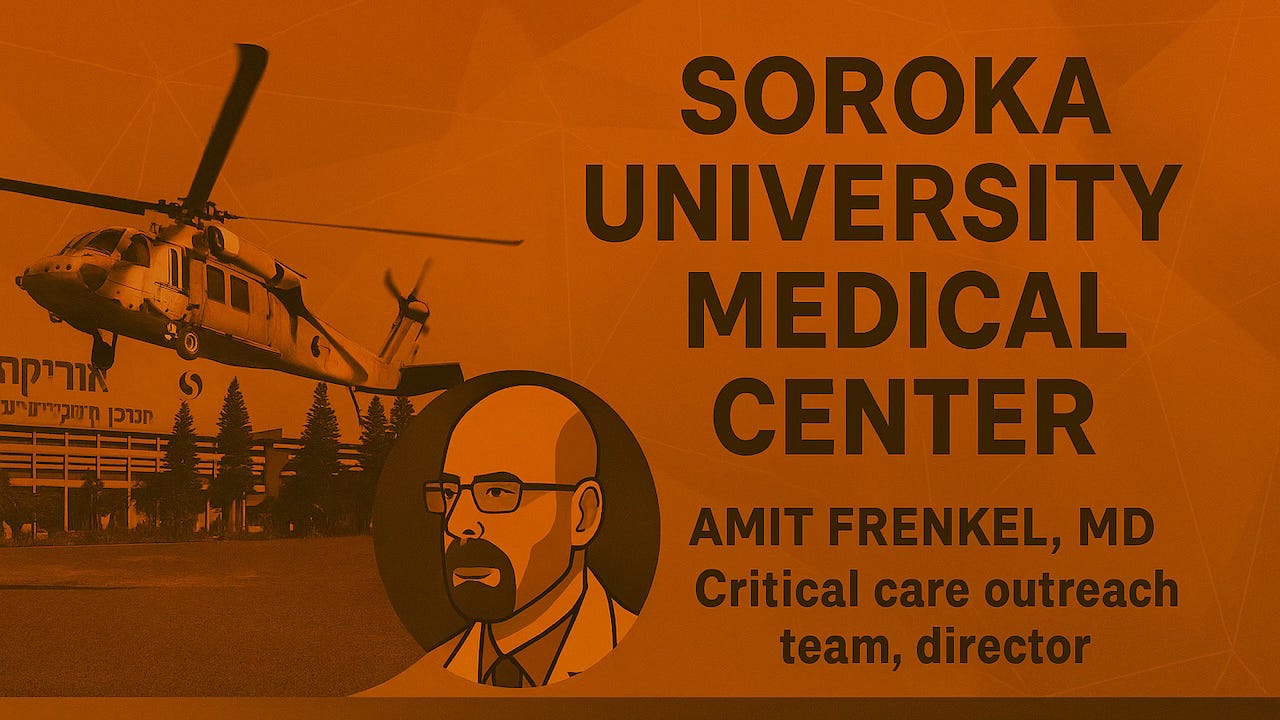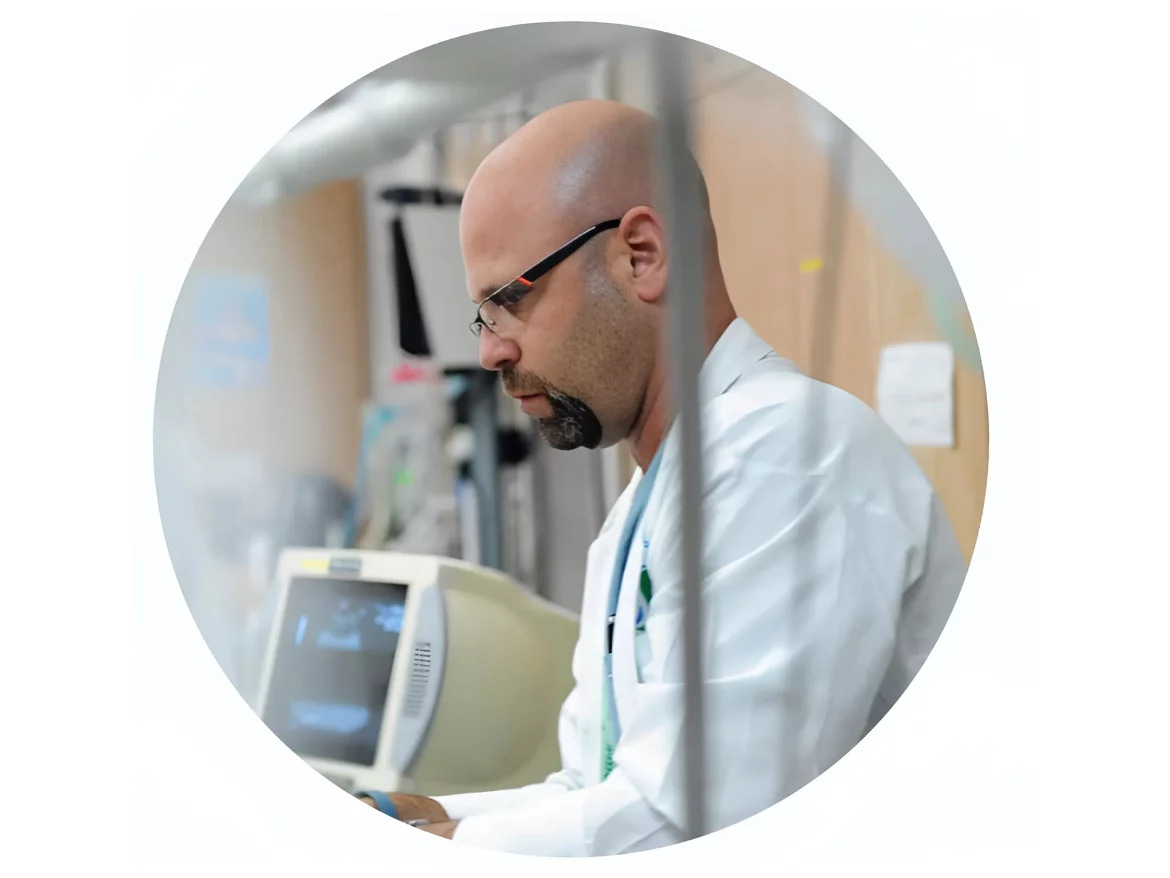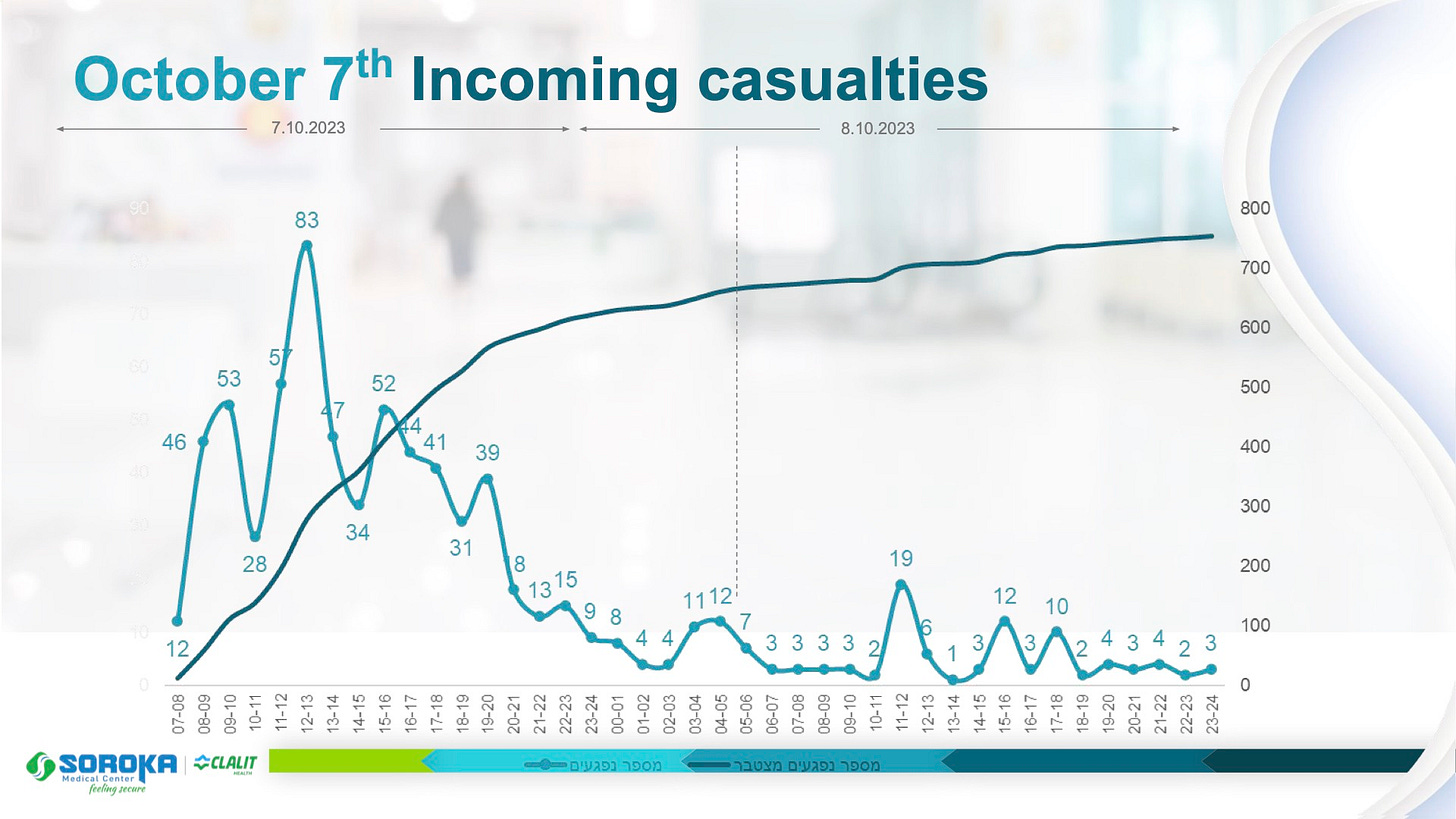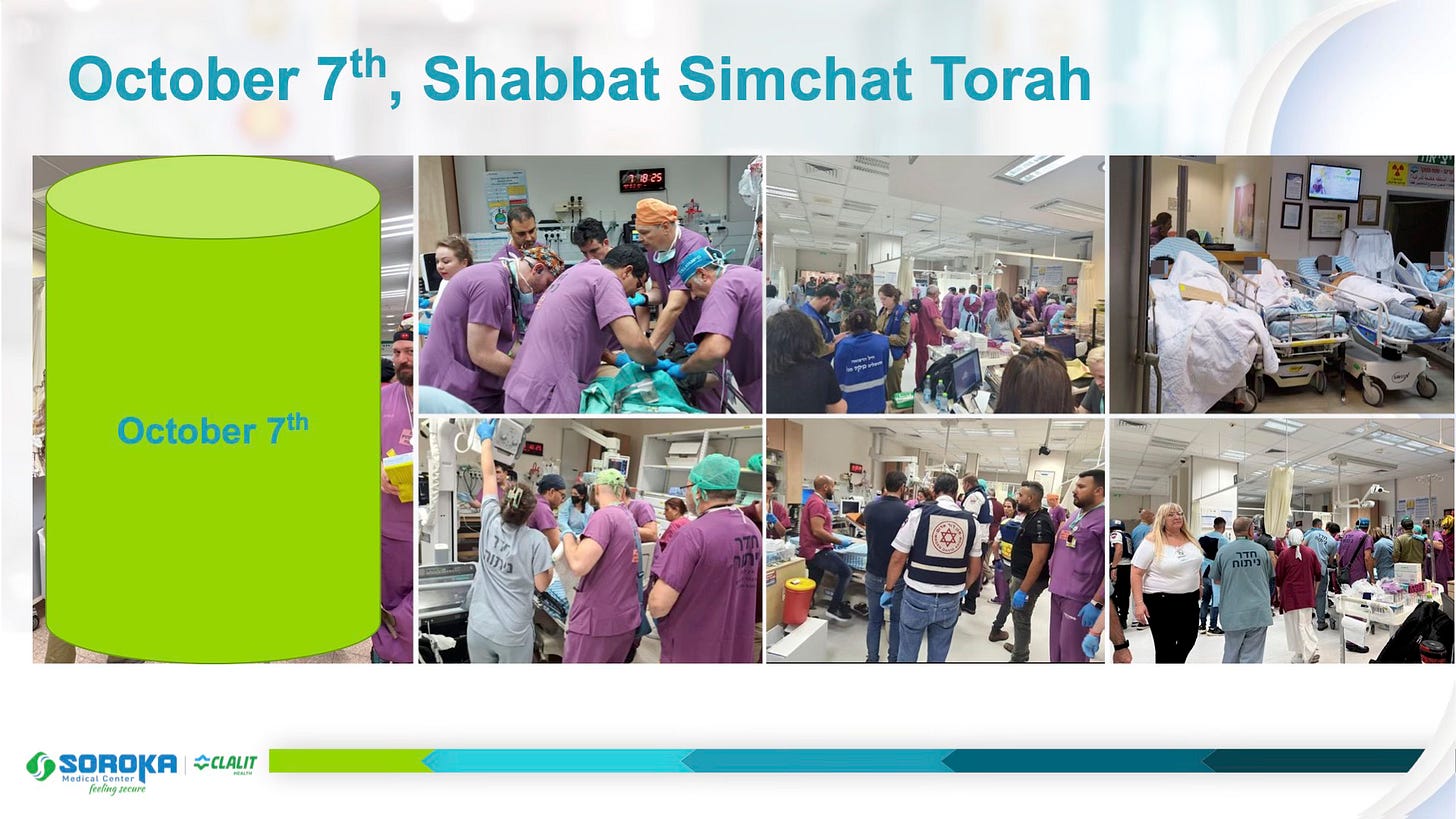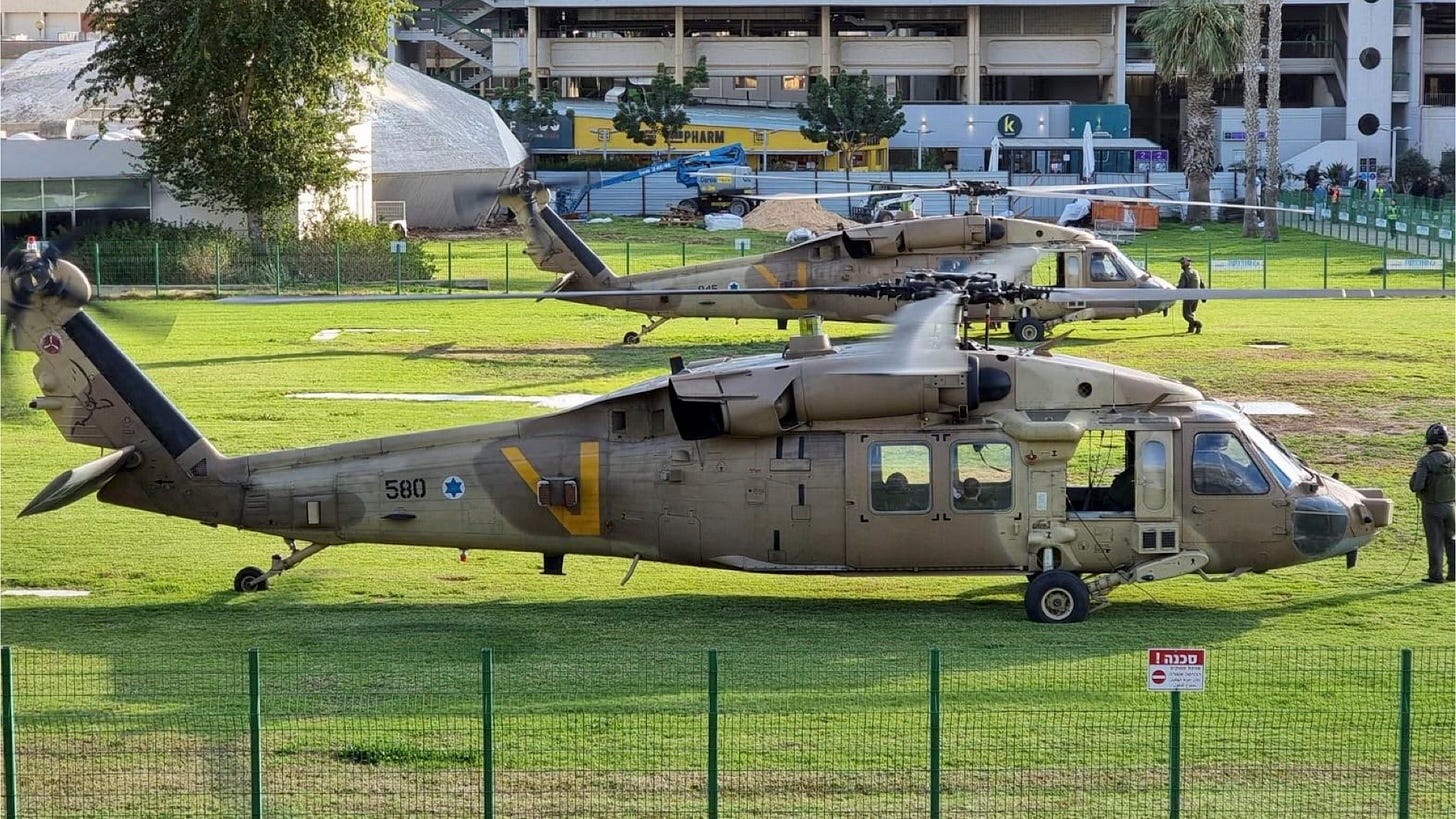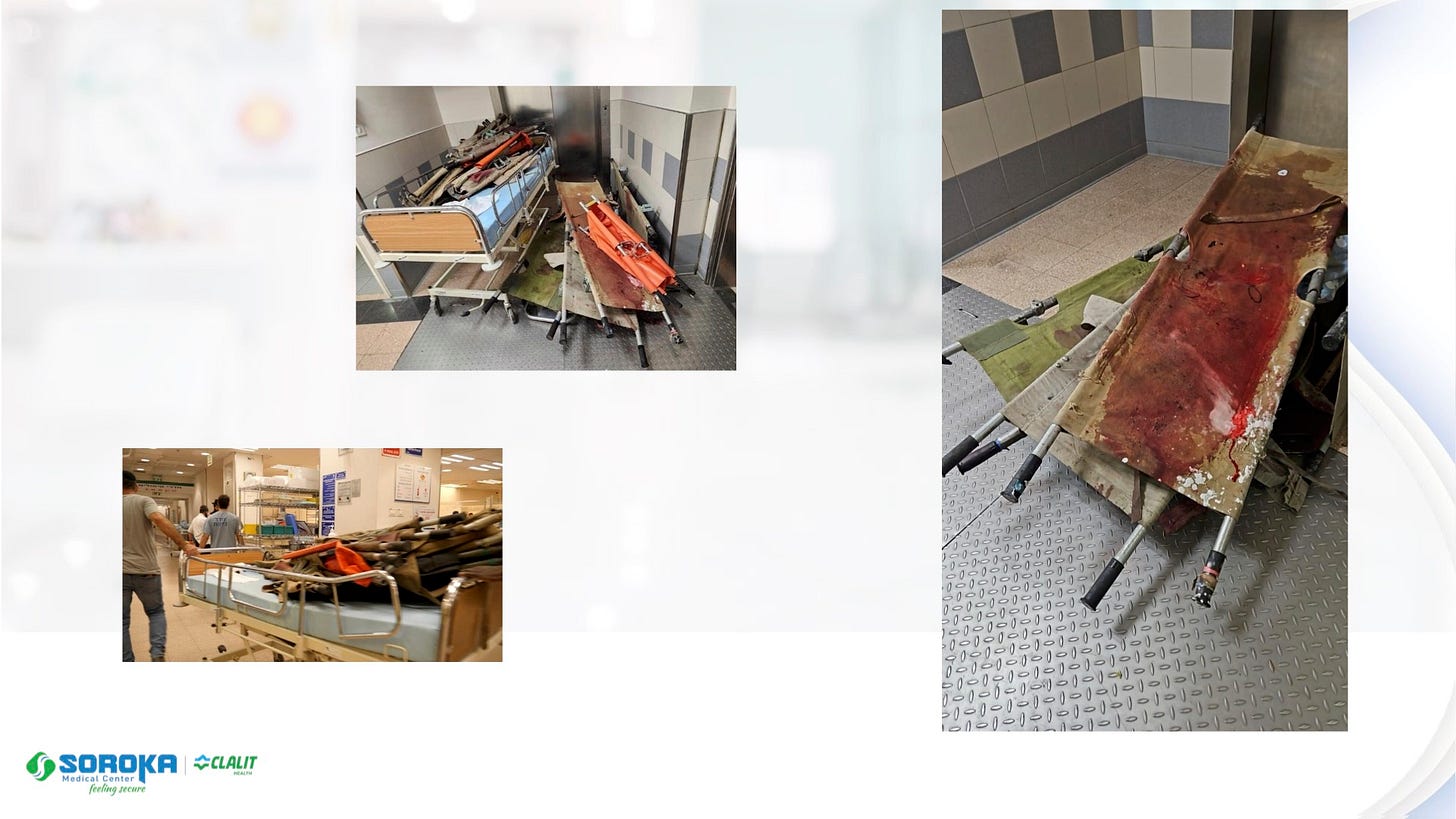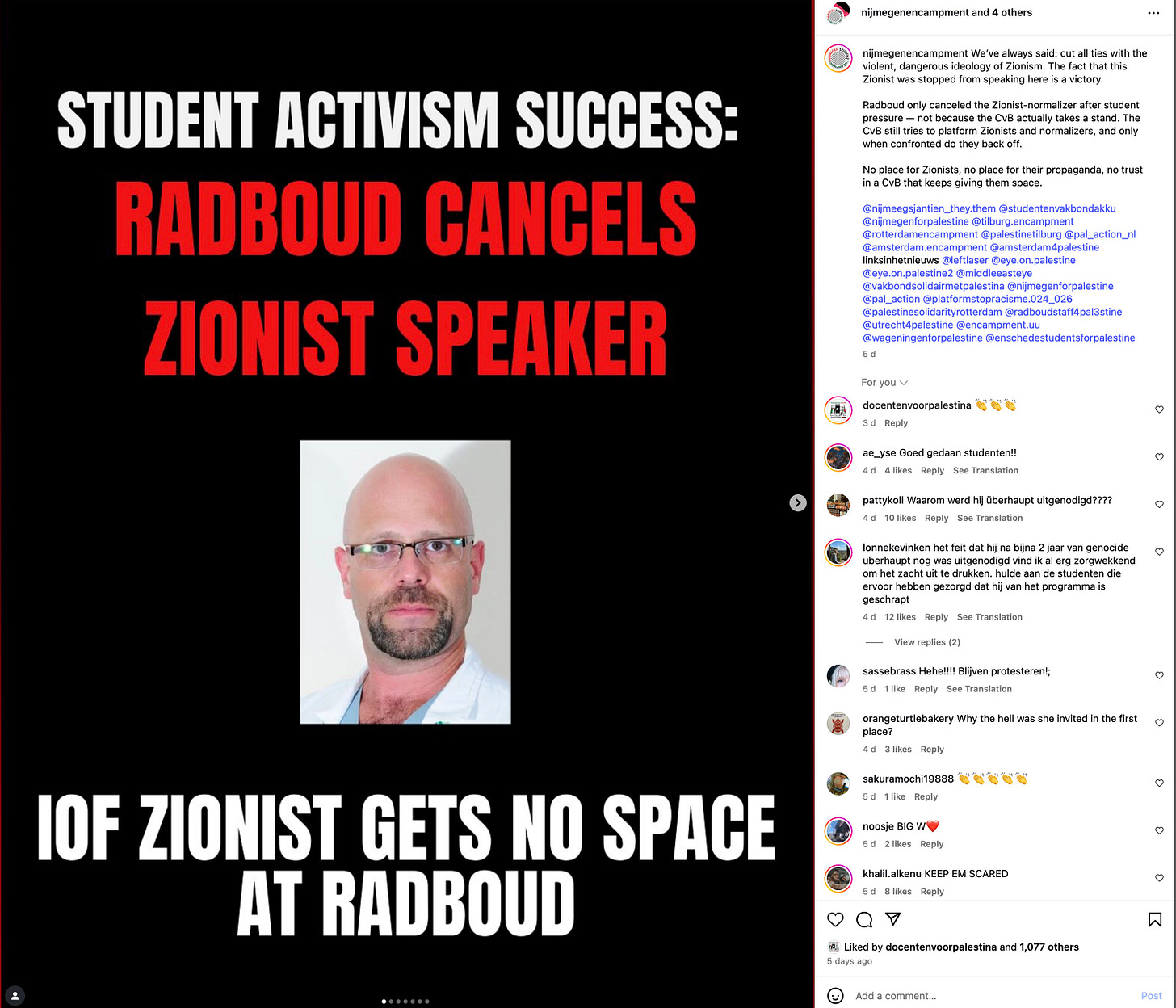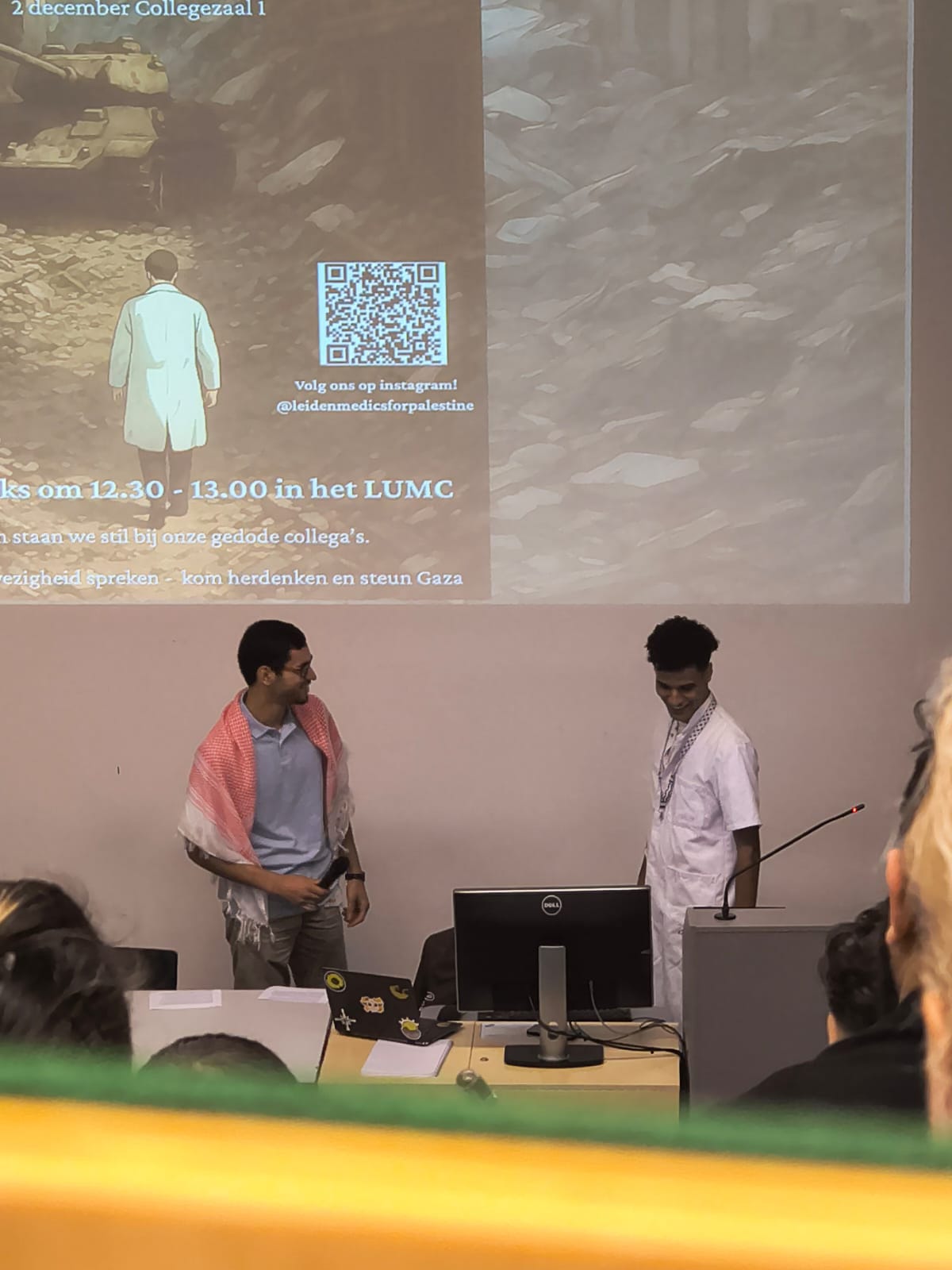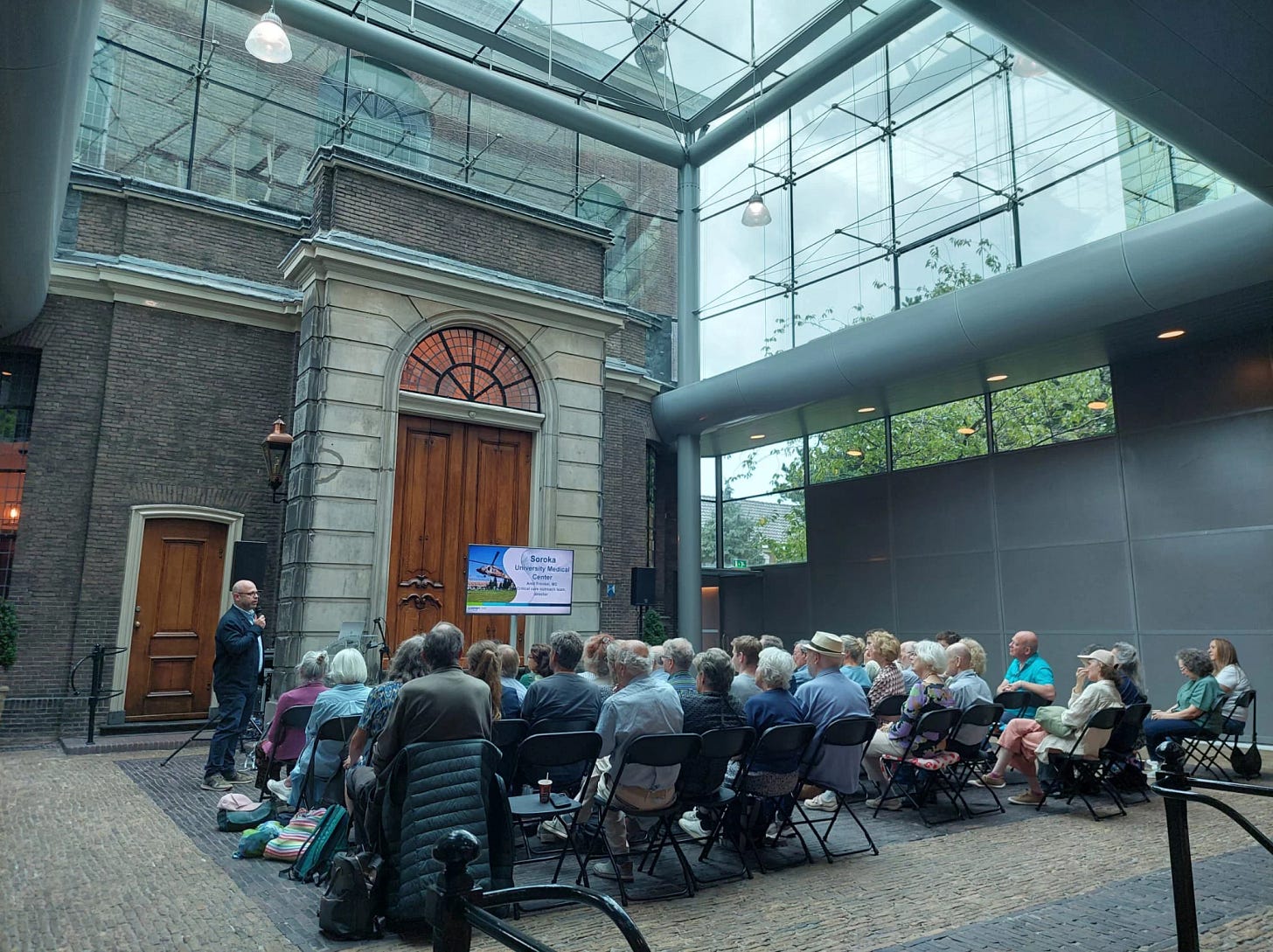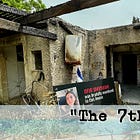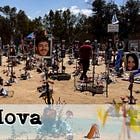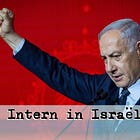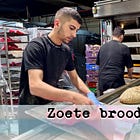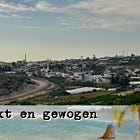Dutch medical universities ban Israeli doctor Amit Frenkel from speaking
Lecture about how Soroka Medical Center treated more than 670 patients within 24 hours deemed 'too political'
Several university hospitals in the Netherlands refused speaking space to Israeli ICU doctor Amit Frenkel. As a physician who treated hundreds of wounded on the frontlines of October 7, he wanted to give a lecture about scaling up during major medical events. Among others, Leiden University Medical Center, Radboud UMC, and Erasmus MC did not allow him to share his experiences and expertise with doctors, medical students, and other interested parties. His presentation would be "too political" and they cited risks to peace and safety. What lessons has the Netherlands missed, and what does this academic unwillingness teach us?
(Note: This interview was originally published in Dutch on 2 September 2025)
Doctor Amit Frenkel thought he was coming to the Netherlands to share experiences about medical scaling for a "mass casualty event." The Israeli intensivist works at Soroka Medical Center in Be'er Sheva (maps), where on October 7, 2023, more than 670 wounded were treated within 24 hours. Frenkel was co-responsible for rapidly scaling up care capacity on the day Hamas invaded from Gaza. Two important decisions ensured the hospital could handle the influx.
Yet his story about that experience and the medical-academic lessons to be drawn from it was refused by various medical universities and academic hospitals. How the 53-year-old doctor's visit came about and was subsequently blocked and canceled, you can read further down in this article. Speaking by phone from Be'er Sheva, Frenkel first tells the story he wanted to share with students and medical staff, but wasn’t allowed to by any Dutch medical university or university hospital.
"My function is intensivist and in that capacity I am head of the Critical Care Outreach Unit at Soroka Medical Center. But in Israel we also have titles for emergencies. In my case, that's Director for Mass Casualty Events. From that role I would speak in the Netherlands about the events of October 7, 2023. A lecture, as a doctor, without political content," emphasizes Frenkel, a calm speaker with a soft voice who during the conversation doesn't elaborate on the raging war or drift toward opinions about the situation in Gaza.
"The lecture would be about how Soroka treated more than 670 patients within 24 hours. That should be the title."
This is Dr. Frenkel's story of those first 24 hours.
The Experience: 674 Patients in 24 Hours
Amit Frenkel: "At half past six that Saturday morning we woke up in a reality of sirens that wouldn't stop. We heard rockets from the Iron Dome. Border incidents are not unusual, but because the sirens wouldn't stop, I decided to go to the hospital. Management didn't know at that time either that there were hundreds of terrorists roaming around Israeli communities.
"Soroka Medical Center (SMC) is the only medical center in southern Israel, for about 1 million people. I remind you that Israel is very small: SMC is about 45 minutes from the border with Gaza, or 12 to 15 minutes by helicopter. Hospital staff also come from the border zone. Unofficial reports came in via WhatsApp groups from staff about fighting ongoing in the kibbutzim.
"Therefore we decided ourselves at 7 o'clock in the morning to start the procedure for a Mass Casualty Event (MCE). At that moment no wounded had come in yet. This decision was the first game changer: normally you do this when suddenly many people come in, or when police, the army, or the Ministry of Health make an announcement. In this case we decided to scale up ourselves, without notification from the authorities. We knew enough through the private messaging.
"Thus by around 9 o'clock we already had about two hundred staff inside, both those who were called from bed and people coming off night shifts who kept working. From 8 o'clock the first wounded came in, in a way we had never experienced before. Not by ambulance, in which they had already received first aid, but in cars, transported by neighbors or passersby who came to help. They had been shot or wounded by grenades.
"That's abnormal for us, because we're normally not prepared for wounded this way. The influx became very high and we received more than 670 casualties in total in 24 hours. Between 12 and 1 o'clock in the afternoon more than eighty people came in within an hour - more than one patient per minute through the gates. More than 130 people were severely wounded and needed immediate operations, plus critical care before and after.
"However, in SMC we cannot use all parts of the hospital during an air raid or attack, because some buildings are not secured against rocket impacts. Several operating rooms are located in the unsecured parts of the hospital. So we couldn't even use all operating theaters.
"At a certain point we realized we were short of operating rooms and the existing spaces were filling up. I made the decision to deploy the maternity ward, because that part is also secured. It's a separate building, which we converted to trauma care that day. That was the second game changer, because it allowed us to increase capacity to handle the influx.
"Unsecured parts of the hospital complex (which consists of thirty buildings in total - BN) were not used on October 7. That we were wise to do so became clear a few months ago when an older, unprotected part of the hospital was hit by an Iranian rocket. We were extremely lucky: the building had been evacuated just 48 hours earlier, there were no patients left and most medical instruments had been removed.
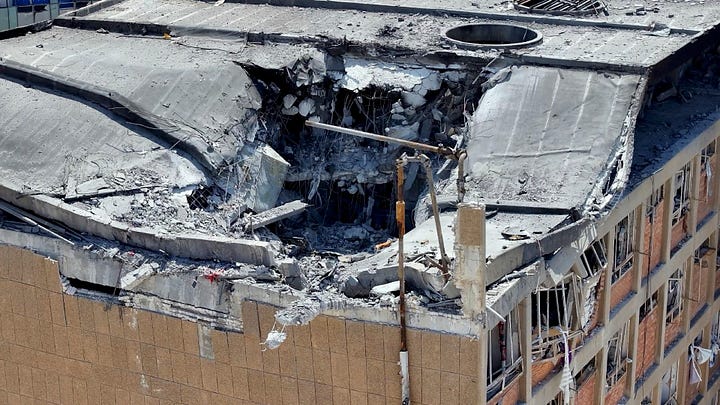
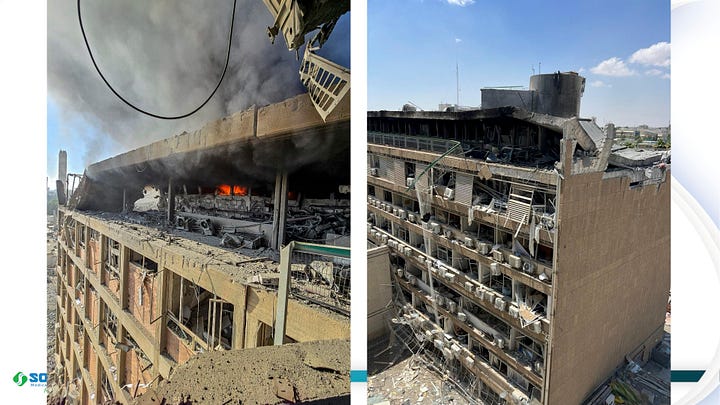
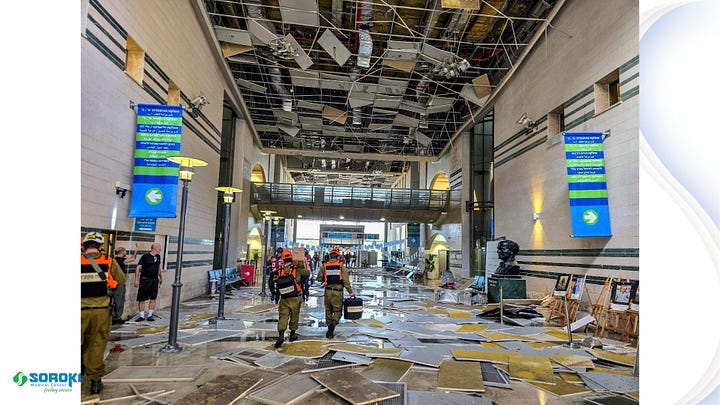
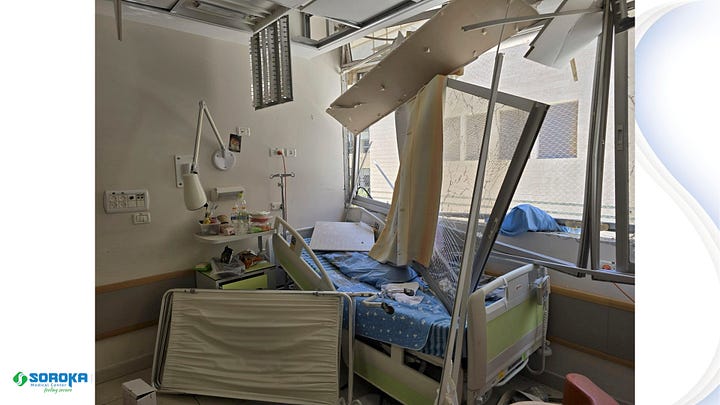
"You must know that SMC has a very well-trained staff. We are a so-called Level 1 Trauma Center, a regional trauma center that treats multiple patients with serious injuries daily. Not in these quantities, but continuously. We could therefore save almost all people who were brought in.
"Don't forget: Israel is a small country. We got help quickly. From Saturday afternoon and evening we got more people from other parts of the country: doctors, nurses and physiotherapists came from the center and north. We also began transporting patients elsewhere after their treatment, if they were stable enough. Evacuation had to be done by ambulance and helicopters while the air raid alarm was still sounding. The first 24 hours were very intense. In the first 48 hours, 136 operations were performed, of which 53 were orthopedic procedures. Amputations, yes.
"After that the situation calmed down and I could return to my own ICU department, which was full of civilians and soldiers. It has remained busy there ever since."
At Soroka hospital about 5,500 people work in total and there are beds for 1,200 patients. During the first days after October 7, many thousands of people were working in the hospital, also to care for the hundreds of 'regular', already present patients. Since the beginning of the war, almost 4,500 patients have been treated, including more than 3,300 military personnel and also seven hostages who returned from Gaza. More than three hundred times, so approximately every other day, an army helicopter with evacuated, wounded IDF soldiers from Gaza landed on the hospital's helipad.
Not only their own military receive medical help, although the specific question of whether Hamas terrorists or other hostile elements have also been treated at SMC gets a general answer: "We have certainly also treated enemies during the war. We treat everyone regardless of origin or conviction. I hope every other hospital in the world does the same."
Dr. Frenkel's own son was stationed at a military base in the south on October 7: "He called early in the morning and said he was safe in a shelter. My wife and I received no further messages until lunchtime. We didn't really know what was happening in the area around the Gaza border at that time either. We didn't know that military bases were also being attacked. I was worried but I wasn't aware of that. Only when we spoke later did that realization come."
The doctor quickly switches back to the hospital and his patients. "Most people who came in during the weekend of October 7 were civilians, including 44 children up to sixteen years old and 27 people aged 65 or older. The terrorists shot at all people without regard to person. But the first operation we performed on October 7 was on a 22-year-old pregnant woman who had been shot in her uterus. We saved her but we couldn't save her baby. About fourteen months later she returned to the hospital, this time to give birth to a healthy son. That was a beautiful conclusion for all of us."
The Lesson: Accept the Unacceptable
What are the main lessons from a mass casualty event where enormous numbers of wounded are brought in within a short time?
Dr. Frenkel: "You must accept the unacceptable. And you must practice for a mass casualty event again and again. Again, and again, and again. We did that at least twice a year. Not just ourselves but also with soldiers who practice in the hospital. The Ministry of Health does it too. That's the most important lesson for students and doctors: you never know when something big like this happens - it could also be a train accident or an attack. You must prepare for it.
"We did everything we could that weekend and I'm very proud of the result. We lost few people (just less than three percent of the victims didn't make it - BN). It was a terrible day but we did everything in our power to treat so many people.
"Of course we evaluated. You can always do things better, especially details. The big picture, however, is: everyone was helped on time, no one had to wait, everything went quickly and with good flow. The way it proceeded helped us with processing and understanding. We not only did our best but also managed to save almost everyone with emergency interventions and operations. We are very proud of our work."
The Refusal: Academy Closes the Shutters
Dr. Amit Frenkel was invited by Vered Raz, a Dutch associate professor at Leiden University Medical Center. She tells NN that there was open consultation with the Board of Directors for speaker initiatives about Gaza and Israel, and that there was interest. "The intention was to bring an Israeli doctor to the Netherlands and have him dialogue with a Palestinian doctor in Gaza. That doctor is against Hamas and therefore may not work in a hospital. I want to let those kinds of voices be heard in the Netherlands."
Raz says she was put in contact with Frenkel and that he immediately indicated he wanted to speak 'only professionally, not politically.' "Fine, I thought, that's what LUMC wants too. I also immediately contacted other academic hospitals." This was in June. Eventually the Board of Directors drew a line through the plan on August 18, after Frenkel had already booked his tickets.
Board member (and cardiologist) Martin J. Schalij emails a brief rejection to Raz that day:
"We discussed the subject extensively in the Board of Directors today. We have concluded that this is not the way we want to provide space for this. So, perhaps disappointing for you, we do not agree to provide space for this debate."
Raz: "On the same day there was an invitation on the intranet for everyone to participate in a demonstration for medical workers in Gaza."
"Everything is being made political," sighs Raz. Professional, academic, administrative: everything. We're reaching the point where profession and politics can no longer be separated. That's not just unfortunate, that's dangerous. We should be thinking: how can we do better, in the Netherlands, with less polarization?"
Besides LUMC, Radboud UMC in Nijmegen and Erasmus Medical Center in Rotterdam were approached about whether they had interest in a lecture by Amit Frenkel. EMC never responded, says Avigal Brilleslijper, a company doctor in training who acted as organizer for the lectures from her position as founder of the Jewish Medical Network.
Amsterdam UMC also didn't respond. Board chairman (and paediatrician) Hans van Goudoever let it be known:
"From the Board we take no political standpoint and also allow no speakers who highlight either the more pro-Israeli or the more pro-Palestinian side of the conflict. We find what's happening terrible, but don't want to bring the conflict within the hospital walls. Different standards apply to universities, we want to be a safe haven for all our patients at all times."
"UMC Utrecht and UMCG in Groningen were also approached but Utrecht didn't respond and Groningen declined," Brilleslijper completes the list. "Radboud even waited until two days before the event." In Nijmegen, Prof. Jan W.A. Smit, MD, PhD - dean and vice chair Executive Board then closed the shutters:
“We have considered your request in an Executive Board Meeting of Radboudumc. We have decided to decline your request. First, the topic of medical response to terrorist calamities is indeed an important subject. However, addressing this issue in the context of October 7 places the lecture immediately in the broader tragedy of the Israel-Hamas war. Therefore, in our view, this topic cannot be dealt with in a politically neutral fashion. Second, in line with this conclusion, we judge that there are serious concerns in terms of safety, both for Radboudumc and Radboud University.”
When the organization subsequently sought an alternative location, intimidations and threats came from pro-Palestinian student groups. That meeting was then also canceled. "After that we still held a small meeting elsewhere," says Dr. Vered Raz. "Because otherwise they win." On Instagram, the extremist students still celebrated their victory. The soft-spoken trauma doctor is portrayed by name as a "nazi" in a post.
The meeting planned for LUMC was held for a small group of interested people in the Glass Hall at the synagogue of the Liberal Jewish Community in The Hague. In Amsterdam, a meeting was also quickly organized within the Jewish community, but when the Israeli embassy tried to set something up and invited the press, only De Telegraaf showed interest. Besides space and attention in that newspaper, only De Gelderlander devoted a few words to the refusal of an Israeli doctor who wanted to come speak about his field and experience at a Dutch university.
"This isn't about politics, but about medical knowledge. In a world full of crisis situations, the expertise of doctors with practical experience is vital," sighs Avigal Brilleslijper. "When universities and hospitals refuse speakers out of fear, they lose their essence: a place for dialogue, research, growth and free knowledge exchange.
"Fortunately, the Netherlands has never had a comparable multi-trauma crisis situation, but unfortunately Israel does have that expertise. The refusal of all academic hospitals to offer him a platform is therefore extra painful and harmful. Not only does it go against the core values of the medical profession, it also undermines the quality and resilience of our care."
LUMC employee Raz: "Today there was a meeting within LUMC of 'Leidenmedics4palestine.' They wore keffiyehs, which is also a political statement. In every hospital there are monthly demonstrations by doctors for Gaza, where Palestinian products are sold. With permission from the Board of Directors. Some Jewish colleagues stay home on such days, out of fear."
Raz continues: "The media and social media play a harmful role, they steer this debate in the wrong direction. And many people follow because it's easier to follow the voice under which you're safe. Meanwhile, even pleading for academic freedom makes you unsafe. People are afraid to talk, afraid for their work. There's a culture of fear. The majority is silent, the minority dictates the rules.
"But LUMC is a good hospital, and must remain neutral. That's why I wanted to bring him here," Raz concludes. "We can't show that to the outside world now and that's regrettable. We must keep talking and remain in dialogue."
Brilleslijper: "Not one of the hospitals looked further at who Amit Frenkel actually is. They saw a doctor from Israel, who treated patients on October 7, and rejected him."
Frenkel describes his visit to the Netherlands as "a particularly unpleasant experience."
"I'm disappointed but also very surprised. As an academic, first of all, because I know and appreciate that people must settle their issues by listening to each other. Academic locations should be the first places to talk, listen and debate. Particularly disappointing that they don't want to. Secondly, I know the Netherlands as a very progressive country, with an open mind about many subjects. That actually made it even more disappointing."
Would Frenkel think twice before traveling to Germany, England, or perhaps the Netherlands again for a lecture?
"No. As an academic, talking is the only way, so I would love to visit other countries and places to tell this story."
A number of images in this article are taken from dr. Frenkel’s presentation slides.
In closing: stories like these deserve a large audience, so I’m reluctant to put up paywalls. If you appreciate the work, you can donate through this link. At this point, for non-Dutch speaking readers, I wouldn’t recommend a paid subscription upgrade, because the main page is all in Dutch and English texts are rare. For now, at least. Actually, this is literally the first one.
Of course, you can subscribe to the English Below Section of “Nijmans Nieuwsbriefje” (Nyman’s Newsletter), go to your account to set the notifications to just this sub-section, and receive an e-mail or notification in the app when I publish something in English. Cheers!



